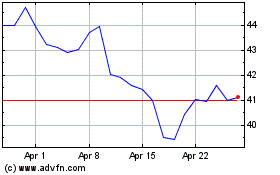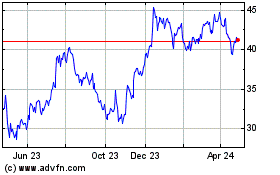U.S. Bank Helps Expand Nationwide Access to Nutritious Food
June 22 2011 - 2:15PM
Business Wire
U.S. Bancorp Community Development Corporation (USBCDC), a
subsidiary of U.S. Bank (NYSE: USB), today announced that it will
allocate a significant portion of its New Markets Tax Credit (NMTC)
investments to projects that increase healthy, affordable food
availability in high-need urban and rural communities across the
country. The initiative also intends to support the creation of new
jobs and stimulate local economic development in low-income
communities.
Matt Philpott, Director of New Markets, Historic and Renewable
Energy Tax Credit Investments for USBCDC, said, “Access to healthy
food is a critical problem for millions of Americans. While we are
proud to have a strong record of investing in projects that promote
healthy outcomes, we agree that there should be broader effort to
invest in businesses that will address this issue. By working with
our valued partners across the country and leveraging the United
States Department of Agriculture, Health and Human Services and the
Department of Treasury’s capabilities and resources, we believe we
can make great strides to accomplish this collective goal with the
NMTC Program.”
As the country’s most active NMTC investor, USBCDC has worked
with partners to support projects that focus on healthy living and
food-focused businesses. Examples include:
- Save-A-Lot grocery store in Pagedale,
MO, the first retail project built in the community for
decades;
- An Alaskan sustainable fishery near
Platinum that supports the careers of more than 1,400 fishermen who
now have a place to sell their local catch from Goodnews Bay;
and
- A Fresh Grocer in the nation’s oldest
African-American-owned shopping center that created 225 new jobs in
North Philadelphia, PA.
USBCDC’s commitment is in line with the Healthy Food Financing
Initiative (HFFI), which is addressing the healthy food needs of
communities that currently lack nutritious options by making
financial and technical assistance available to Community
Development Entities (CDEs), Community Development Financial
Institutions, other nonprofits, and businesses with sound
strategies for addressing the healthy food needs of communities
that currently lack nutritious options. The United States
Department of Agriculture (USDA) notes that more than 23 million
people currently live in low-income communities that do not have
access to a supermarket or large grocery store within one mile of
their home.
About the Healthy Food Financing
Initiative (HFFI)
The HFFI is a partnership between the United States Department
of Agriculture, Health and Human Services, and the United States
Department of Treasury. Nineteen programs from these three
Departments are currently available to promote HFFI in distressed
urban and rural communities. Federal funds—which include tax
credits, grants, and low-cost loans—support projects ranging from
the construction or expansion of a grocery store to the
distribution of healthy food into areas coined as “food deserts.”
To learn more about food deserts and to locate census tracts
identified as food deserts, visit USDA on the web at
www.usda.gov/fooddeserts.
About U.S. Bancorp Community
Development Corporation (USBCDC)
USBCDC finances community development and affordable housing
projects through the use of New Markets Tax Credits, Historic Tax
Credits, Low-Income Housing Tax Credits, and Investment Tax Credits
in Renewable Energy. USBCDC is the most active New Markets Tax
Credit investor in the country, investing billions of dollars
nationwide in hundreds of transactions. These equity investments
have provided much needed revitalization and new resources to
communities throughout the country. It is a subsidiary of U.S.
Bank, the fifth largest commercial bank in the United States, whose
parent company is U.S. Bancorp. Learn more at www.usbank.com.
About the New Markets Tax Credit
Program (NMTC Program)
Created in 2000, the NMTC Program is administered by the U.S.
Treasury Department’s Community Development Financial Institutions
Fund (CDFI Fund). The NMTC Program spurs investment of private
sector capital into distressed communities by providing a tax
credit to corporate or individual taxpayers who make qualified
equity investments in designated CDEs. The CDEs in turn, invest the
capital raised into projects and businesses in low-income
communities. The credit provided to the investor totals 39 percent
of the investment in a CDE and is a seven year credit allowance
period. Since the inception of the NMTC Program, the CDFI Fund has
made 594 awards—totaling $29.5 billion in tax credit allocation
authority—to CDEs through the NMTC Program. The equity raised
through the tax credit stimulates economic growth, supports job
creation and fosters small business growth in distressed
communities across America.
US Bancorp (NYSE:USB)
Historical Stock Chart
From Jun 2024 to Jul 2024

US Bancorp (NYSE:USB)
Historical Stock Chart
From Jul 2023 to Jul 2024
